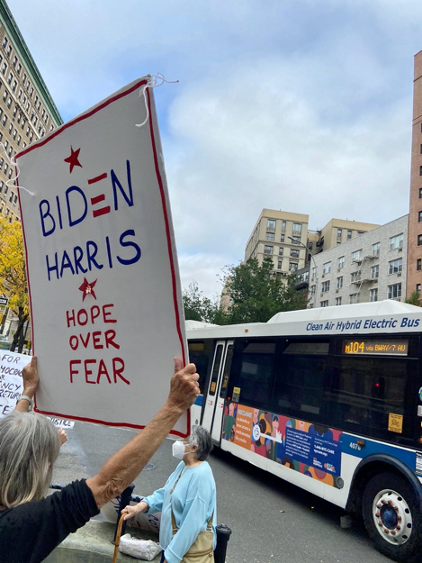It’s honks versus f-bombs on West 107th Street in Manhattan. And right now, the honks are winning.
A trio of Manhattan residents have turned an intersection on the Upper West Side into a cacophonous public square. Waving signs that direct passers-by to “Honk for Biden,” they elicit reactions from New Yorkers of all political stripes.
“I’d say it’s about 35 honks in support for every five f-bombs,” says Rikki Samuels, 82, a former skating coach at Rockefeller Center.
Andrea Craig, 79, a former restaurateur, and Deirdre Wulf, 82, a former reproductive-health researcher, began demonstrating on the corner of Broadway and West 107th Street in June to display solidarity with the Black Lives Matter movement. Unable to participate in strenuous marches because of health concerns, they began making their voices heard on the corner every day from 1 p.m. to 2 p.m.

Samuels joined in July, one of many enthusiastic residents who walked by and said they’d join the demonstration the next day. Unlike others, she showed up.
In September, a friendly neighbor offered the women extra cardboard posters, left over from demonstrations of support for health-care workers. The trio used the materials to pivot toward mobilizing support for the Democratic presidential ticket.
“We need to raise the popular vote margin,” said Craig. “We want it to be so large that it’s overwhelming, especially in an election with so much confusion and suspicion.”
Horns in support blare from every type of vehicle: cars, taxis, Postal Service trucks, and even MTA buses. One woman rolled down the window of her taxi to scream, “Honk!” A pedestrian ran up from the crosswalk to jump up and down, yelling “Honk! Honk! Honk!”
Every so often, the group meets political opponents. Sometimes, they’re met with slurs or middle fingers.
But for the group, raising awareness for their beliefs is cathartic. Craig and Samuels were active in community organizing in the 1960s and say they need to participate in what they feel is a similarly charged political moment.
“The idea of not doing it?” begins Craig.
“We would go crazy,” says Samuels.



